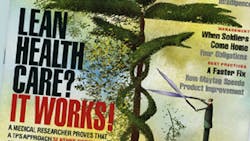Editor's Page -- Curing The Health-Care Costs Blues
It's starting to seem that after two decades, everybody has tried everything and looked everywhere to reduce -- or at least slow -- the exploding rise of health-care costs.
But we haven't.
We haven't forced -- or cajoled, or encouraged, or even asked -- the health-care community to take a hard look at itself -- at the money, time and materials it consumes (some would say "wastes"), and at the poor level of service and quality it provides to us.
... we've let the one supplier with our fastest-growing costs continue to operate unchallenged.
We expect -- and get -- the lowest cost and highest quality from every other supplier we work with (the best of us partner with them to achieve it), yet we've let the one supplier with our fastest-growing costs continue to operate unchallenged. Sure, we've forced change in parts of the health-care delivery system in the United States. But up to now, our efforts have focused on peripheral issues, not where the big costs are -- doctors offices, nurses stations and hospital wings.
It's as if we're comforting the patient while his temperature rises. We're waiting for divine intervention to break the fever and praying he doesn't flatline before then.
We've changed the payment system using HMOs to manage costs, negotiating reduced payments to control costs and increasing user co-pays and deductibles to shift costs. . . . But we haven't tried to eliminate non-value-added cost from the system at the source.
We've tried to change the behavior of the health-care recipient, our employees, by plying them with information and "wellness" programs. Help employees manage chronic illnesses, stop smoking, start exercising and generally practice healthier lifestyles, the thinking goes, and they'll require fewer doctor visits, hospitalizations and expensive drugs.
More recent versions -- the market-based approach -- zero in on the financial incentives. Help employees, who have been insulated from the sticker shock by insurance coverage, understand the costs. Make them pay more, postulates this theory, and they'll buy less. . . . But we haven't asked caregivers to change their behavior by streamlining their work processes.
Of late, proponents of the market-based approach have taken an increasingly harder edge. It's time we faced facts, they say: If you can't afford the best health care, tough luck. There's simply not enough money to pay for all our country's health-care needs, so someone has to do without or with less. . . . But we haven't demanded that insurance providers simplify their plans so the health-care community won't have to employ -- and we don't have to pay for -- legions of workers to fill out and file redundant forms.
Indeed, we haven't even reviewed how our own health-benefit management processes contribute to the complicated, confusing, time-consuming mess.
We've even fingered a new villain -- malpractice lawyers -- as the cause of health-care cost spikes, tracking and bemoaning their ever-rising contribution to our dilemma. . . . But we haven't implemented metrics to specifically identify and track those top 20% most costly procedures, so that we can alleviate the pain they cause.
The remedies we've tried have worked -- to a point; they've stabilized health-care costs for a few years here and there; and it's frightening to imagine how much worse off we'd be if we had ignored the problem. But this appears to be a chronic condition, and we need on-going therapy to address it.
In "Lean Health Care? It Works!" you'll read about a group of manufacturing leaders that believes lean management is, if not a cure, at least a potent course of treatment that will reverse the debilitating trends. And you'll read about a researcher who's conducted some successful clinical trials.
If you're still skeptical, consider that it's at least worth a try.
We've tried everything else. Patricia Panchak is IW's editor-in-chief.
She is based in Cleveland.
About the Author
Patricia Panchak
Patricia Panchak, Former Editor-in-Chief
Focus: Competitiveness & Public Policy
Call: 216-931-9252
Follow on Twitter: @PPanchakIW
In her commentary and reporting for IndustryWeek, Editor-in-Chief Patricia Panchak covers world-class manufacturing industry strategies, best practices and public policy issues that affect manufacturers’ competitiveness. She delivers news and analysis—and reports the trends--in tax, trade and labor policy; federal, state and local government agencies and programs; and judicial, executive and legislative actions. As well, she shares case studies about how manufacturing executives can capitalize on the latest best practices to cut costs, boost productivity and increase profits.
As editor, she directs the strategic development of all IW editorial products, including the magazine, IndustryWeek.com, research and information products, and executive conferences.
An award-winning editor, Panchak received the 2004 Jesse H. Neal Business Journalism Award for Signed Commentary and helped her staff earn the 2004 Neal Award for Subject-Related Series. She also has earned the American Business Media’s Midwest Award for Editorial Courage and Integrity.
Patricia holds bachelor’s degrees in Journalism and English from Bowling Green State University and a master’s degree in Journalism from Ohio University’s E.W. Scripps School of Journalism. She lives in Cleveland Hts., Ohio, with her family.
